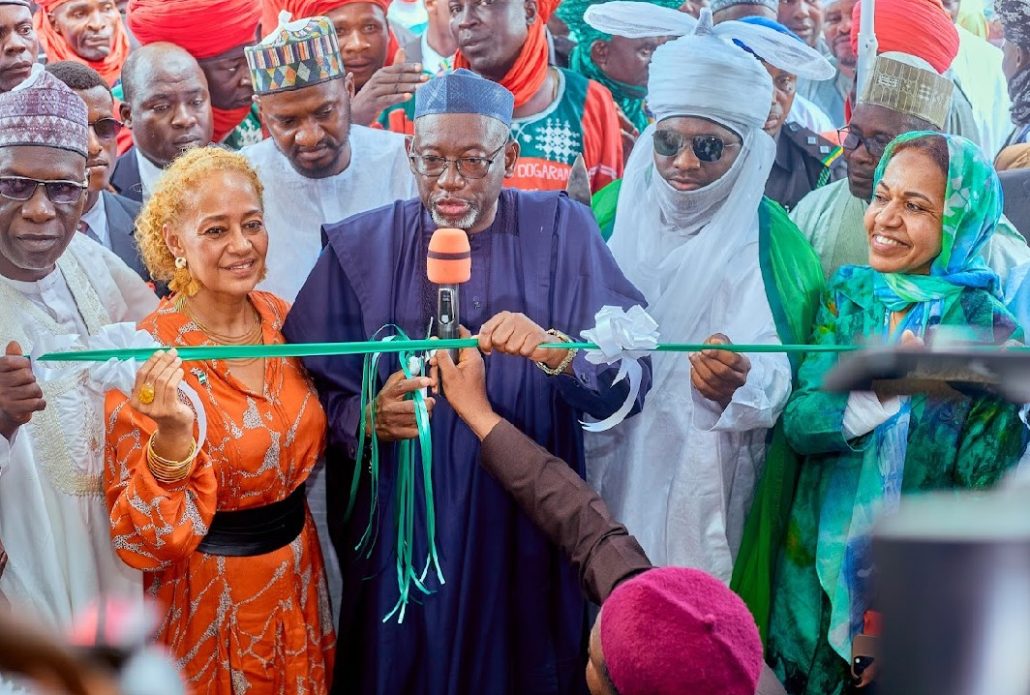
Photo caption: H.E. Governor of Jigawa State Mallam Umar Namadi,Head of Development Cooperation, British High Commission Abuja, Cynthia Rowe, His Royal Highness, the Emir of DutseAlhaji Hamim Sanusi, and the UNICEF Representative in Nigeria, Wafaa Saeed at the commissioning of Chamo PHC CRIBS Project in Jigawa.
The United Kingdom Government yesterday announced a fresh £19 million funding support for climate-resilient health and education facilities in Nigeria, with Kano and Jigawa States as the first beneficiaries.
The announcement came at the joint inauguration of 84 newly renovated schools and health centres under the Climate Resilient Infrastructure for Basic Services (CRIBS) initiative. The event was held in partnership with the Federal Ministry of Health, the Kano and Jigawa State Governments, and UNICEF.
The CRIBS project is an innovative model designed to safeguard essential services—particularly schools and health centres—from the growing threats of climate change, including floods, droughts, and extreme heat.
So far, 39 primary healthcare centres and 45 schools have been upgraded with targeted adaptation measures in Kano and Jigawa. The facilities were unveiled in a series of ribbon-cutting ceremonies and site visits attended by state officials, development partners and community leaders.
British High Commission’s Head of Development Cooperation in Abuja, Cynthia Rowe, said the UK Government was proud to be part of a programme offering sustainable solutions to climate vulnerability in Nigeria.
“This £19m commitment reflects the UK Government’s determination to support Nigeria in strengthening its basic services. CRIBS demonstrates how climate-resilient infrastructure can improve access to healthcare and education for vulnerable populations. We hope this model inspires broader adoption across the country,” she said.
UNICEF Representative in Nigeria, Wafaa Saeed, described the project as a testament to the power of partnerships in addressing pressing development challenges.
“By investing in climate-smart infrastructure, we are not only protecting services but also empowering communities to safeguard their children’s future. CRIBS is a model for building resilience where it matters most—at the frontline of service delivery,” she added.
Nigeria is ranked the second most climate-risk prone country for children globally, with millions affected each year by extreme weather events. The CRIBS initiative, officials explained, was designed to provide a scalable, low-cost, and community-owned response that federal and state governments can replicate nationwide.
Launched in April 2024 and funded by the UK’s Foreign, Commonwealth and Development Office (FCDO), CRIBS is being implemented by UNICEF alongside partners including the World Bank, World Health Organisation (WHO), Crown Agents, UK Lafiya Programme, JigSaw, Fab Inc, and Sextant Foundation.
Following its successful rollout in Kano and Jigawa, the model will now be expanded to Bauchi, Enugu, Gombe, Kaduna, and Katsina States.
The inauguration also underscored Nigeria’s alignment with national priorities on climate action, health, and education, while reinforcing the UK’s broader commitment to supporting Africa’s adaptation to climate risks.